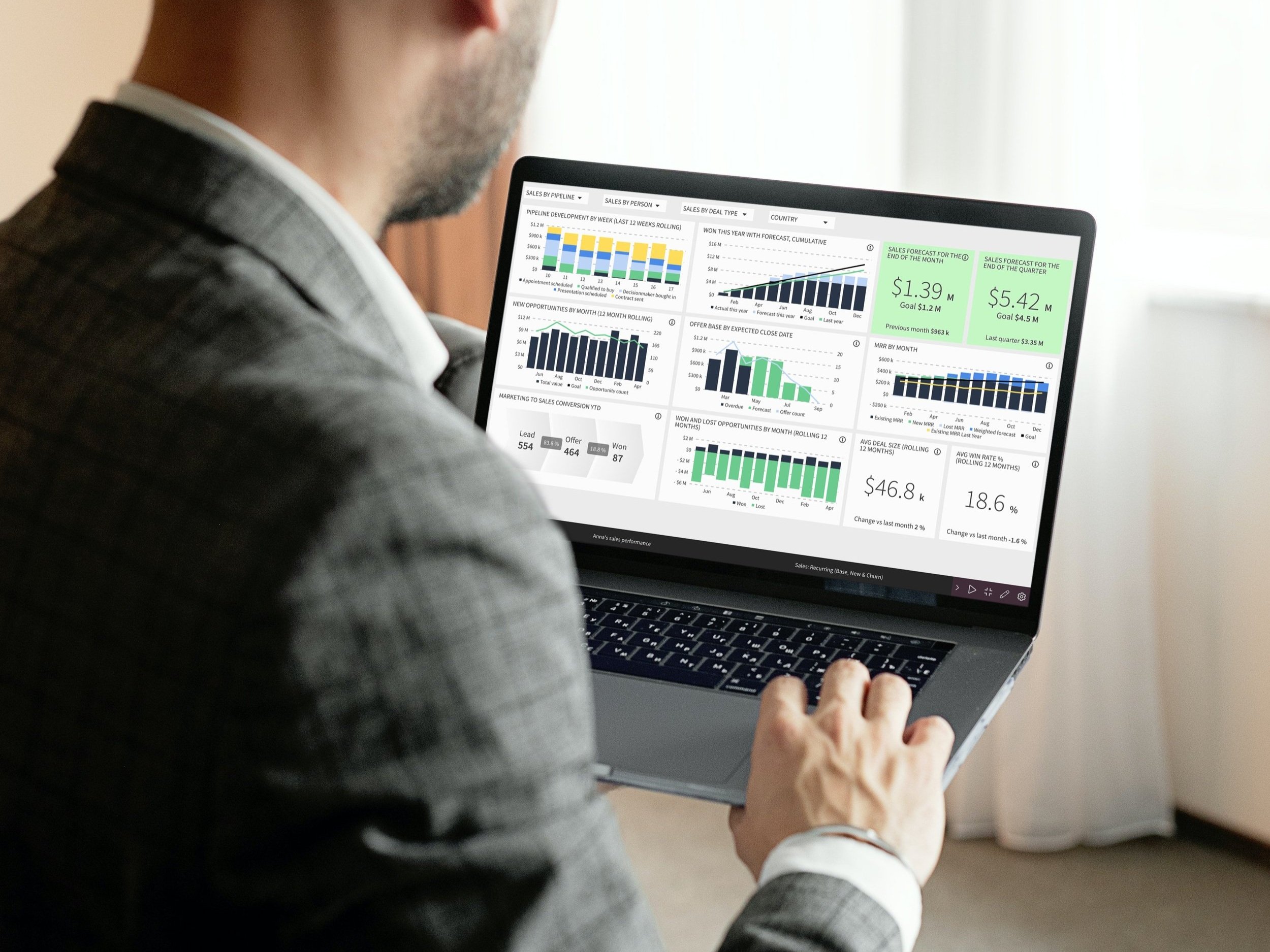Pipedrive CRM has grown in popularity. We have worked with Pipedrive customers for many years to design sales and revenue reports, recurring revenue insights, and revenue projections. In this post, we cover our best tips for Pipedrive sales and revenue reporting.
Pipedrive is a web-based CRM software that has been gaining a lot of traction over the past decade. The system has gained praise for its ease of use and affordable price. Hence, it has become a solid choice for many small and, increasingly many, mid-sized businesses.
Dear Lucy has been a Pipedrive partner for many years and Dear Lucy is one of the best rated add-ons on the Pipedrive Marketplace - a global directory of apps and tools that can help you expand on your Pipedrive capabilities. We know Pipedrive data inside and out and have helped dozens and dozens of teams make the most of their sales and revenue data.
In this blog, we’ve collected our best practices for Pipedrive sales and revenue reporting and forecasting.
Build Relevant Sales & Revenue Reports For Different Uses
Establish Common KPIs for Sales
Project Future Revenues from Pipedrive Payments
Monitor and Forecast Recurring Revenues (ARR & MRR) from Pipedrive
Define Clear Goals And Targets for Sales Reps and Teams
Make Sure Sales and Revenue Reports Get Used
1 Build Relevant Sales & Revenue Reports For Different Uses
The first principle in defining sales and revenue reporting is to ensure the data and insights are relevant to what you are trying to achieve. A good practice is to map out, when will you use the reports and for what purpose.
When defining Pipedrive sales and revenue reports for your team, you want to keep it simple. At the same time, ensure that the data provides the needed answers for various teams within the organization.
When setting up your sales and revenue reporting structure with Pipedrive and Dear Lucy, consider at least the following uses for the data:
Weekly sales team meetings
Performance reviews between sales reps and their managers
Monthly leadership team meetings
Sales forecasting and revenue projections
Board and investor meetings
Each may require a slightly different set of sales and revenue KPIs to provide sufficient input for decision making.
2 Establish Common KPIs for Sales
As Gartner writes:
Sales key performance indicators (KPIs) are metrics that help sales teams measure their effectiveness and efficiency, with the overall goal of improving methodologies and processes to drive sales.
When defining which KPIs to monitor, we recommend to start small. Establish the first few KPIs first, learn how to really use them and only then add additional metrics. Selecting the KPIS is also about understanding
Selecting the right KPIs is also about understanding and modelling your sales process. What drives success in your sales? Is it the volume of activities? The number of booked demos? The number of offers sent?
Dear Lucy has developed a comprehensive gallery of ready-made sales KPIs for Pipedrive that are available out-of-the-box. Visit our live product demo for examples of popular sales and revenue metrics and how they have been visualized on dashboards.
With the ready-made gallery, you do not need to start building your reports from scratch but can get a head-start with our tried and tested metrics that you can trust.
3 Project Future Revenues from Pipedrive Payments
Your finance department and investors are interested in your future sales outlook and revenue projections. So you want to ensure you have a solid structure in place to provide those.
If your business model is such that customers’ payments come in several installments but not necessarily at a regular interval or at set amounts, make use of the Pipedrive Payments Schedule that you can find under Pipedrive Revenue.
Pipedrive Payments allows you to record the payment schedule for a deal including the flexibility to adjust the payment amounts. You will need these to define the payment schedule:
Total amount — the total value of the payment
Number of payments — the total number of customers’ payments
Interval — the amount of time between each payment
Start date — the starting date of the payment schedule
Dear Lucy works seamlessly with Pipedrive Payments and helps you make the most of it. Dear Lucy helps you to get a thorough view of the revenue streams on Pipedrive Payments - regardless of your Pipedrive plan. Dear Lucy pulls data hourly from Pipedrive and provides you with an easy view of all payments over time.
4 Monitor and Forecast Recurring Revenues (ARR & MRR) from Pipedrive
If you have a subscription business - for example a software-as-a-service company - you need to be able to monitor Recurring Revenues from Pipedrive.
Recurring revenues can be measured
on a monthly basis (Monthly Recurring Revenue, MRR) or
on a yearly basis (Annual Recurring Revenue, ARR).
To keep track of recurring revenue, you can use Pipedrive’s Subscriptions that is another set of handy features under Pipedrive Revenue. For each recurring subscription, you can define:
Recurring amount — the value of each recurring payment
Number of payments — the total number of cycles
Interval — the amount of time between each cycle
Start date — the starting date of the subscription
Once these are in place, Pipedrive and Dear Lucy combination allow you to monitor the key recurring revenue KPIs, view trends over time and forecast recurring revenues.
Dear Lucy provides a comprehensive set of Recurring Revenue metrics and dashboards examples to get started with. Some examples of the most typical Recurring Revenue metrics include
Monthly Overview: Total MRR by month
MRR / ARR Growth %
Churn rate %
Gained & lost MRR this month
5 Define Clear Goals And Targets for Sales Reps and Teams
Insightful and easy-to-use sales and revenue reports can be a powerful management tool if they lead to action and improvements. A vital element for being able to draw conclusions and guide activities are jointly agreed goals.
Dear Lucy has a “goal engine” that allows you to define a target for any sales or revenue metric from Pipedrive. Not just sales quota (i.e. value of won deals) but a selection of leading performance indicators as well.
With Pipedrive and Dear Lucy combo, you can define targets for e.g.
Basic sales results e.g.
Value of won deals (€)
Number of won deals (#)
Sales pipeline e.g.
The number of new deals opened
Size of the offer base (€)
Hit rate %
Sales activities e.g.
Number of meetings held
Number of demos booked
Number of offers sent
Define targets for the entire company, a business unit, a sales pipeline, a product, or for individual sales reps. And remember, if your business fluctuates seasonally, define different targets for each quarter or a month.
Once the targets have been set, Dear Lucy compares actual performance (pulled hourly from Pipedrive) against the targets.
Dear Lucy splits monthly or quarterly targets into daily targets and indicates whether you are progressing towards your goals at the right speed. Red and green indicators indicate where you are and help you focus on areas that need the most work.
5 Make Sure Sales and Revenue Reports Get Used
Finally, you will need to make sure that the insights you have actually impact your business. Sales is at the heart of your company, and its growth and you want to ensure decisions are driven by data and insights from Pipedrive.
The data itself is rarely the problem - and if you’re using Dear Lucy for Pipedrive sales and revenue reporting and forecasts, you will have easy access to everything you’ll need. The challenges typically lie in the way data and insights are used - or not used.
So make sure to carve out enough time to embed the use of sales and revenue reports into the daily ways of working.
Here are some examples of what you might do:
Organize training sessions to introduce reporting tools and the ways in which to use them
Invite team members to access sales and revenue reports with their own user credentials (or link it to SSO), so everyone can find the key sales and revenue metrics whenever they need
Help team members set up access to reports from their mobile phones
Use sales and revenue dashboards during meetings to showcase them regularly
Embed Dear Lucy dashboards on internal websites or collaboration tools that allow embedding of external content
With the help of Dear Lucy, you can display key sales and revenue KPIs on info screens at the office to keep them front and center
Organize regular refreshers or drop-in sessions on sales analytics to provide an easy way to ask for support
PIpedrive and Dear Lucy are a truly powerful combo and can provide you with a very robust way to create best-in class sales and revenue analytics for your team, your CEO, CFO and the board.
When you make sales and revenue insights available to your teams in an easy and intuitive way, and help them genuinely use it as part of their day-to-day work, magic starts to happen!
Interested?
Dear Lucy offers a wide range of sales and revenue insights and forecasting tools for Pipedrive. You can select your favorite KPIs and charts from the library of 300+ ready-made metrics, bring in custom fields from Pipedrive or have our team build metrics just for you.
Book a session with our expert to learn more!





